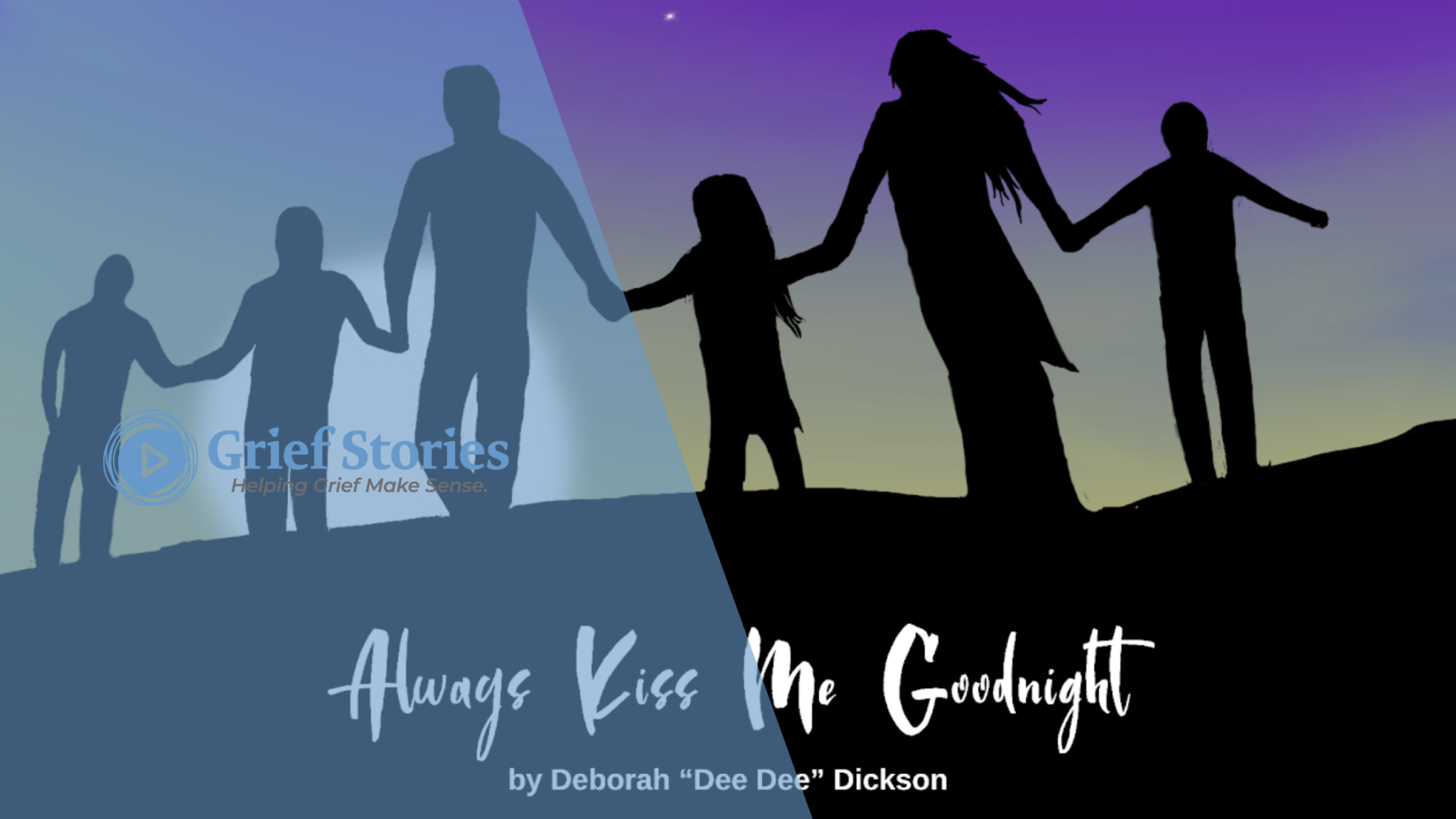Posts Tagged ‘childrens grief’
Always Kiss Me Goodnight : Deborah Dickson
Deborah Dickson recently released a book about grief for children called Always Kiss Me Goodnight. She recently reached out to us at Grief Stories to share a bit about it and the accompanying guidebook for parents and teachers who support kids in grief and we are honoured to share a bit more about this important resource.
Deborah’s mother, Wanda Marie McLaughlin, passed away at age 39 on November 8th, 1974 when Deborah was 19 years old. Her search for understanding and “figuring out what was missing” in her life, turned on an awareness switch. There was more behind this awareness than she realized.
Grief Stories: Tell us a little more about your experience writing Always Kiss Me Goodnight.
Deborah: “Always Kiss Me Goodnight” is based on my true story of heartbreak stemming from the loss of my mom when I was a young adult. I felt responsible for my three brothers, helped with household chores, and worked full time all while trying to navigate my grieving journey.
Writing this book was amazing, tearful, and filled with learning. It was gratifying to be able to share my personal story with children alongside the wonderful digital illustrations by our grandson Ronan to correlate with the story. Keeping the storyline simple but real and informative from my perspective was an amazing learning and therapeutic journey. I am forever grateful for the writing opportunity and for the strength I learned from my Mom. I cherish our family memories. It furthers my belief in being kind and helping others.
I wrote this book about grieving to help others (and myself) acknowledge and understand the challenging and painful emotions one has following the loss of a loved one. I emphasize the importance of asking questions, the never-ending search for answers, and not being afraid to ask for help – these were the pieces I learned from my own journey.”
Grief Stories: Based on your personal experience, what recommendations do you have for parents who are supporting children in grief ?
Deborah: “‘Family’ to me is ‘everything’.
Tragedy can cause so much grief and sadness that family members may fail to recognize each other’s emotions and needs – especially children’s. While it is important to try to be strong, it is also important for children to see a parent’s sadness and tears. Age-appropriate communication is also important, children need to be included in planning and have an understanding of what is going on. It’s important to provide a safe environment for the children to talk about the loss, even if it’s not with you.
People can support children by allowing them to express whatever emotion they are feeling without judgment. If the family is beyond knowing what to do for themselves or their children – reach out for professional help. Don’t continue to be afraid or alone, it is healthier for all to reach out.”
Grief Stories: As is relates to the parent/teacher guide you created to go alongside your book, what are the key tips for supporting children.
Deborah:
- Parents may want to protect their children from painful grief emotions by hiding their emotions. However, it is important that parents take time to recognize, acknowledge, and express their grief in healthy ways. This lets parents honour their own grief needs, while also modeling healthy coping behaviours for their children.
- Communication is vital, reassure them that you or someone else is always available to come to.
- Focus on reassurance, family memories, recall vacations and pictures. Encourage them to draw, make a scrap book, or a collage.
- If you don’t have an answer for them know that that is okay – you ask for help – reach out to professionals and don’t feel that you are all alone dealing with the grieving process.
- Talk to them, hug them, tell that they are loved, that they are heard and they are safe.
Losing my Mom at an early age has impacted my life in so many ways. I wanted to share my story and other resources to help parents and children, should they face a tragedy like the loss of a loved one. I hope that this book can be of some service and an avenue to explore difficult conversations. May you enjoy “Always Kiss Me Goodnight” and hug your family tight and often.
You can find out more about Deborah and “ Always Kiss Me Goodnight “ through her website https://www.neversaygoodbye.ca/home.
Making Space to Hear Them: supporting children in grief
By Alyssa Warmland
Children tend to be naturally curious as they grow and learn to navigate the world. As adults, it’s our job to walk with them through that process of learning and to support their curiosity. It can be hard to do that with respect when we are situated in cultures that don’t acknowledge children as autonomous humans worthy of mutual respect. It can be tempting to encourage kids to ignore their feelings about death and grief or to shut down conversations about it when they ask questions. Sometimes, this is because we just don’t know what to say that is developmentally appropriate, especially with young children. Sometimes, it’s because we haven’t allowed ourselves to develop our own thoughts and feelings about death and grief and it feels uncomfortable for us to talk about.
What grieving children need from adults in their lives is to feel heard, just like adults do. When a child asks questions or talks about death or grief, here are some ideas of things to say and how to prompt conversations that allow us to listen:
– Tell me more about your ideas about dying. What do you think happens after someone dies? Those are good ideas, thanks for sharing them with me. I think [insert your own cultural or family beliefs about death].
– How are you feeling about [the being the child is grieving]? Do you want to tell me about some of your favourite memories about them? It’s okay to talk about it.
– It’s okay to feel however you are feeling. It’s okay to feel scared or curious about dying. You’re not alone. Do you want to tell me more about what’s going on for you? I love you and I’m here for you.
– Death isn’t something people can control, I want to make sure you know it’s not your fault [person/animal] died. Sometimes things just are and we can’t do anything about – them, but we can talk about how we are feeling about it.
It can also help to read children’s books about grief. Even if you don’t read them with your children, they might help give you the language to talk with them about death and grief when you’re not sure what to say. Most professionals recommend using direct language, such as “death”, “dying”, and “grief”, rather than terms like “passing away”, because they are easier for children to understand.
It’s important for children to know they’re not alone in their feelings and that it’s okay to feel hard things with the adults in their lives. Humans are social creatures who crave connection. Even when it’s hard or uncomfortable, pausing our busy lives to make that time for connection with children is important so they can learn how to process grief or whatever other feelings they’re having. It can also be an opportunity to re-parent ourselves. It might help to ask ourselves why we feel uncomfortable with a topic and what our own inner child might need to hear about the feelings that come up for us about death and grief. It’s important to seek out connection and space to process those feelings too, whether that’s through therapy or with other adults we trust to be vulnerable with.
Grief literacy and emotional literacy in general is worth making space for. Children have valid feelings worth expressing and being heard it’s it’s okay to stumble, imperfectly, within those conversations with them. Being with them is what is most important.
Additional Resources:
Kid’s Grief
Kids Help Phone
Children’s Grief Foundation
Children and Youth Grief Network
Children’s Grief Colouring Book
National Alliance for Children’s Grief
Bereaved Families of Ontario
Camp Erin
The Dougy Center
Kids’ books about grief:
When Dinosaurs Die
Badger’s Parting Gifts
The Fall of Freddie the Leaf
The Invisible String
The Heart and the Bottle
Michele – Creative expression and processing grief
Michele – Creative expression and processing grief
Michele tells what advice she would give to her younger grieving selfMichele talks about coping that since being a child how creativity helped


